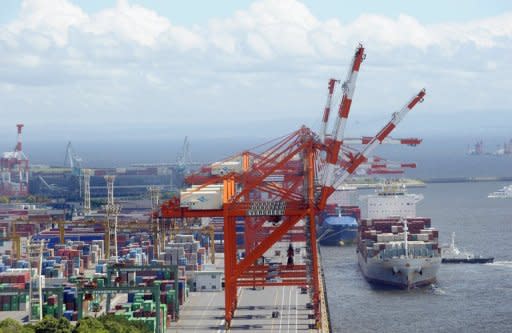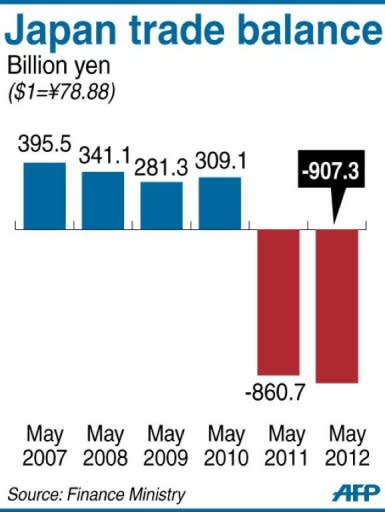Japan May trade deficit jumps on soaring energy costs
Japan logged a bigger-than-expected trade deficit of $11.5 billion in May, hit by soaring energy costs and weakening demand from struggling Europe, official data showed on Wednesday. The figures, which showed a 907.3-billion-yen shortfall in May from a year earlier, revealed that Japan had its first monthly trade deficit with the European Union since records started in 1979. Demand from the continent, a major market for Japanese products, continues to suffer with Tokyo repeatedly warning that the eurozone debt crisis was the biggest risk for Japan's economy, the world's third largest. Tokyo's trade deficit with the EU came to 11.1 billion yen in May, reversing a year-earlier surplus of 25.6 billion as exports of microchips and other electronic parts tumbled. There was, however, contrasting news in the form of exports overall rising 10.0 percent to 5.23 trillion yen as shipments of automobiles and auto parts soared, mainly driven by demand in the United States. "Europe's debt problem is affecting international trade," said Daiwa Institute of Research economist Satoshi Osanai, noting Europe-bound exports from the United States and China were also slowing. "If the European situation worsens, trade figures would worsen further. We have to watch the European problem closely." Japan's overall May trade deficit was a record for the month and 5.4 percent higher than the 860.7-billion-yen deficit in May 2011. It was also well above the 520-billion-yen deficit expected by economists. Overall, imports jumped 9.3 percent to 6.14-trillion yen from a year earlier, largely due to rising purchases of foreign oil and gas. Japan is struggling to meet its energy needs, turning to pricey fossil fuel alternatives after its nuclear reactors were switched off in the wake of last year's atomic crisis at the Fukushima Daiichi plant. Imports rose in volume as well as in value, as power companies stepped up fuel purchases to prepare for heavy summer demand. "The bigger-than-expected deficit increases uncertainty", Osanai said. "(But) considering it was a seasonal surge, we may not have to be overly pessimistic" about the fate of Japan's economy, he added. Mizuho Research and Consulting senior economist Norio Miyagawa said Japan's trade balance "is likely to remain in a deficit at least for the rest of this fiscal year", which ends in March 2013. "Imports will probably keep rising due to energy-related items, while any improvement in exports should remain subdued due to not-so-robust Asian and European economies," he told Dow Jones Newswires.



